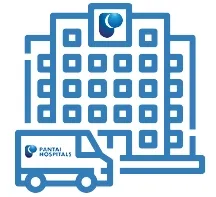The female reproductive system comprises the vulva, vagina, uterus (womb), fallopian tubes and ovaries. Women have two ovaries, one on each side of the uterus. These ovaries produce eggs for fertilisation during the reproductive years.
Ovarian cancer is the growth of abnormal cells that begins in the ovaries. It represents one of the most prevalent cancers among Malaysian women and it typically affects women over the age of 40. Most cases are discovered at an advanced stage, which may result in poor outcomes.
What are the types of ovarian cancer?
There are several types of ovarian cancer:
- Epithelial ovarian cancer
- This is the most prevalent form of ovarian cancer, accounting up to 89% of all ovarian cancers.
- Epithelial tumours form in the layer of tissues just outside the ovaries and often does not present with symptoms in the early stages.
- Germ cell ovarian cancer
- This is a rare form of ovarian cancer which can be benign (non-cancerous) or malignant (cancerous).
- It develops from the ovarian cells that turn into oocytes (germ cells).
- This form of ovarian cancer is more common in young women and adolescents.
- Stromal cell ovarian cancer
- Stromal cell originates from the ovaries’ cells. It is rare and grows slowly.
- Some of the affected cells produce hormones such as progesterone, estrogen, and testosterone. Because of this, there can be noticeable symptoms, such as facial hair growth, acne, or uterine bleeding.
- This form of ovarian cancer is more prevalent among women aged 50 and above.
What are the risk factors for developing ovarian cancer?
The exact cause of ovarian cancer is unclear and there is no certain way of knowing whether you will get cancer. Some non-high-risk women get it while some high-risk women do not.
However, the following risk factors may increase your risk of developing ovarian cancer:
- Personal history or family history of ovarian cancer
- Genetic mutations including BRCA1, BRCA2 or those associated with Lynch syndrome
- Had breast, colorectal or uterine cancer
- Endometriosis
- Trouble getting pregnant or never given birth
- Taken estrogen without progesterone for 10 years or more
- Early menarche or late menopause
- Obesity
- Smoking
What are the signs and symptoms of ovarian cancer?
In its early stages, ovarian cancer exhibits minimal or vague symptoms. The disease frequently progresses undiagnosed until it reaches an advanced stage due to the symptoms being vague.
Symptoms, even vague ones should be thoroughly assessed to allow for early detection. Ovarian cancer symptoms include:
- Vaginal bleeding or discharge that is unusual
- Pain in the pelvic area
- Pain the abdominal area
- Back pain
- Bloating or abdominal swelling
- Feeling full quickly and/or having difficulty eating
- Changes in bowel habits such as constipation
- Urgent or frequent need to urinate
- Fatigue
- Weight loss
You must pay attention to your body. See your doctor if something feels off or if you experience unusual vaginal bleeding or other symptoms for more than two weeks.
How are the stages of ovarian cancer determined?
Staging is done based on physical examination, scans, and biopsies. It ranges from stages 1 to 4, where greater stages indicate a poorer prognosis of ovarian cancer. The lowest stage indicates the cancer is limited to one ovary and the highest stage indicates the cancer has spread to other parts of the body.
- Stage 1: Cancerous cells are present in one or both ovaries and may also be on the ovaries’ surface or fluid from the abdomen.
- Stage 2: Cancer has spread from the ovaries to other tissues in the pelvic area, such as the uterus or fallopian tubes.
- Stage 3: Cancer is now present outside the pelvis. Ovarian cancer usually spreads to the omentum, intestine, diaphragm, and surface of the liver.
- Stage 4: Cancer has spread beyond the pelvis and abdomen, such as the lungs, liver, or spleen.
How do doctors diagnose ovarian cancer?
Ovarian cancer is diagnosed after performing several tests. Your doctor would initially inquire about your overall health and symptoms before performing a thorough physical examination.
- Pelvic examination of the ovaries and other pelvic organs for the presence of lumps or other abnormalities by the doctor.
- Blood tests to check for tumour marker CA-125.
- Imaging tests such as transvaginal ultrasound, computed tomography (CT scan), magnetic resonance imaging (MRI).
- A laparoscopy to view the ovaries and take a tissue sample for a biopsy.
- A biopsy to collect a small sample of tissue to be examined and to determine cancer type and grade.
Learn more about the different types of screening and diagnostic procedures performed to diagnose ovarian cancer.
How is ovarian cancer treated?
The treatment recommended by your doctor will depend on several factors, including the type and stage. Surgery, chemotherapy, and radiotherapy are common treatments, but hormone therapies and targeted therapies are also used.
- Surgery
Ovarian cancer surgery is usually a major procedure. During surgery, the doctor removes as much of the cancer as possible. The surgical procedures include:
- Bilateral salpingo-oophorectomy (BSO): Removal of both ovaries and fallopian tubes
- Total abdominal hysterectomy: Removal of the ovaries, fallopian tubes, uterus (womb), and the cervix
Surgery to remove as much cancer as possible may be used in combination with chemotherapy in cases of advanced ovarian cancer.
- Chemotherapy
With chemotherapy, drugs are taken orally or intravenously to kill cancer cells. Chemo drugs circulate the body through the bloodstream. Thus, it is an effective way to treat ovarian cancer that has spread. Your doctor might also recommend intraperitoneal (IP) chemotherapy. With IP chemo, a large dose of drugs is injected straight into the abdominal cavity to target the cancer.
- Radiotherapy
Radiotherapy employs high-energy radiation to reduce the size of tumours and kill cancer cells. It is often used to shrink tumours before they are surgically removed and to alleviate symptoms of advanced cancer. However, radiotherapy is not typically the main treatment for ovarian cancer.
- Targeted therapy
With targeted therapy, drugs work to block the formation of new blood vessels in the tumour or destroy specific enzymes needed by the tumour to grow. Targeted therapy is sometimes used together with chemotherapy.
- Hormone therapy
Hormones are required by some ovarian tumours to grow. Hormone therapy inhibits the production of oestrogen, thereby inhibiting the cancer's progression. Hormone therapy can be taken orally or via injection.
Learn more about the different types of treatment technologies to treat ovarian cancer.

What can I do to reduce the risk of developing ovarian cancer?
There are currently no effective ways to prevent ovarian cancer. However, there are measures you can take to help reduce your risk of developing the disease:
- Giving birth
- Breastfeeding for one year or more
- Use of contraceptive pills for five years or more
- Having hysterectomy or tubal ligation
Do I need to get screened for ovarian cancer?
There are currently no available routine screening tests for the early detection of ovarian cancer. Pap smear tests very rarely detect ovarian cancer, and when they do, the cancer is typically at an advanced stage. Other tests such as the human papillomavirus (HPV) test are also not very effective in detecting ovarian cancer.
Blood tests to check CA-125 levels may be performed to check for abnormal CA-125 levels in individuals at high risk.
Make an appointment at Pantai Hospitals
Early detection of ovarian cancer makes it easier to treat the disease with effective and appropriate treatment. A dedicated multidisciplinary team of specialists and oncologists at Pantai Hospitals is available for consultation to provide the best care and assistance to patients through screening, diagnosis, and treatment.
Get in touch with us to book an appointment today if you have any concerns or questions about ovarian cancer treatment options.
Pantai Hospitals have been accredited by the Malaysian Society for Quality in Health (MSQH) for its commitment to patient safety and service quality.


 Request an Appointment
Request an Appointment.webp?sfvrsn=276ce14_1/vector-(3).webp) International Patient
International Patient

.webp)


 Find A Doctor
Find A Doctor


.png?sfvrsn=71934c60_8)
.png?sfvrsn=1370dfbd_9)






